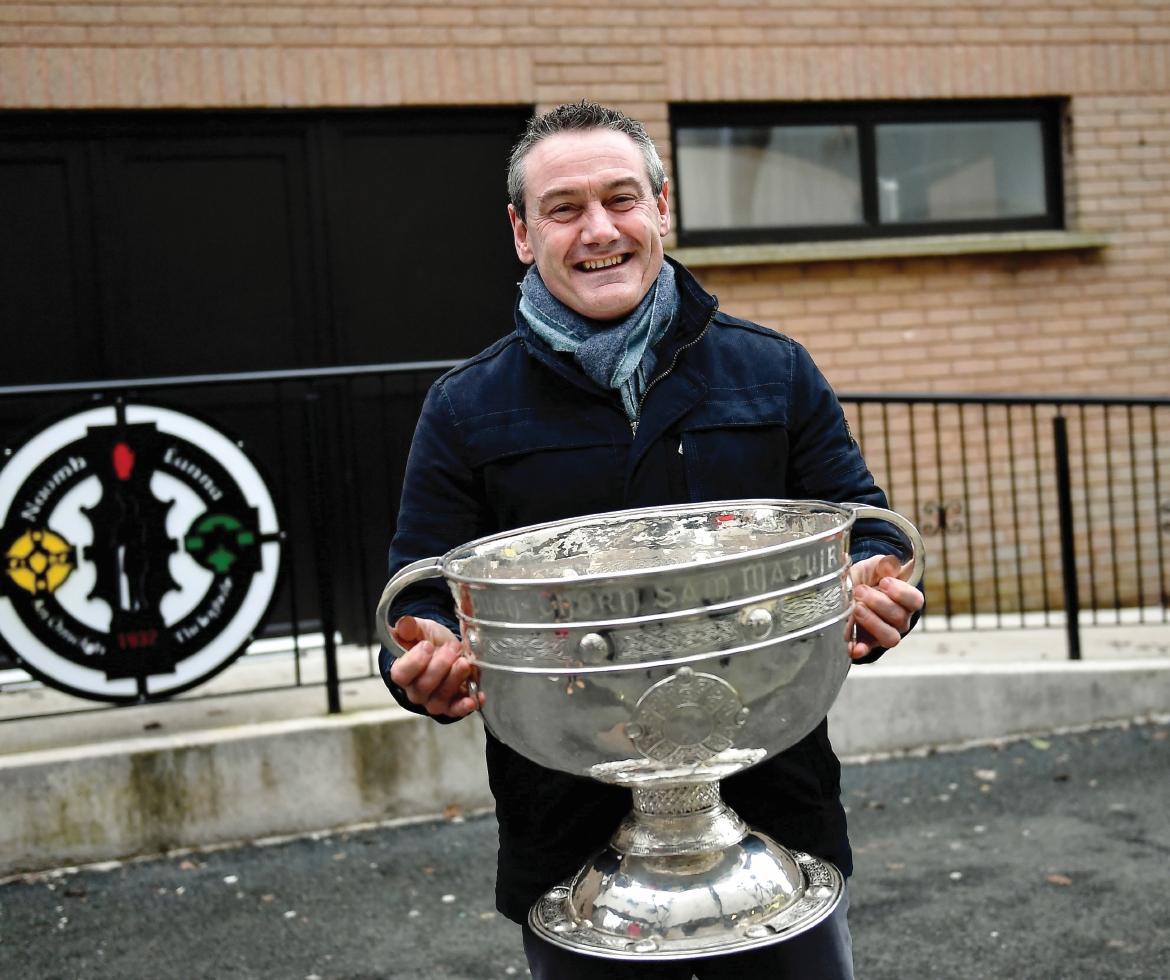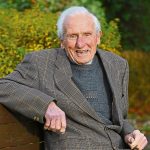Strabane man and Ulster GAA President Ciarán McLaughlin will head up the committee to oversee the development of Gaelic Games across the world. He tells Michael McMullan of the importance of the role…
IN the eyes of many, Ciarán McLaughlin is the guy perched beside the captain on final day, handing over the silverware after delivering the customary speech.
At the recent Gaelic Life All-Star function, he spoke with sincerity and perfection on his pride at the rise of Ulster teams, the importance of the planned integration of all codes and Jarlath Burns coming into office as GAA President.
But you don’t have to dig deep to find a man who has ticked plenty of boxes. It’s fair to say, on his rise in GAA administration, he’s not a talker. He’s a doer.
St Mary’s PS in Strabane gave him the first taste as a player before the local Sigersons club had fully taken root in 1986 after a few failed attempts.
There was a love of the game and he recalls his uncle Eugene gifting him a first jersey. Like so many back in the day, a senior debut came at 14.
He had to make do with a Junior League title after coming short in two championship finals but he was part of the team promoted to senior in 1998.
By that time, he was dipping his toe into the first of two terms as chairman. The first was a busy one. He was the senior manager when Errigal Ciaran defeated them in the 2000 semi-final. Youth officer was also his brief, finishing his third term in charge of the club’s youngsters two years ago.
“Coaching was always my interest and my love,” he began of the deep rooted interest in the GAA.
He soon offered himself to help coach the Tyrone development squads. When Tyrone won the 2008 Minor All-Ireland, he was the liaison in Raymond Munroe and Cathal McAnenly’s management team.
There was also a stint as a referee but his coaching took him into the role of Tyrone youth officer. The role carried the responsibility of coordinating the underage fixture programme.
“Kieran McHugh and myself came up with the two-touch policy at u-14 to try to encourage more participation and more touches of the ball,” he said.
At committee level, McLaughlin spent time as vice-chairman of Tyrone GAA before a six-year stint in the chair. From there, it was on to the Ulster Council where he served as treasurer, vice-President before his current President role. It was a progression he never envisaged when he was a player earlier in life making a difference
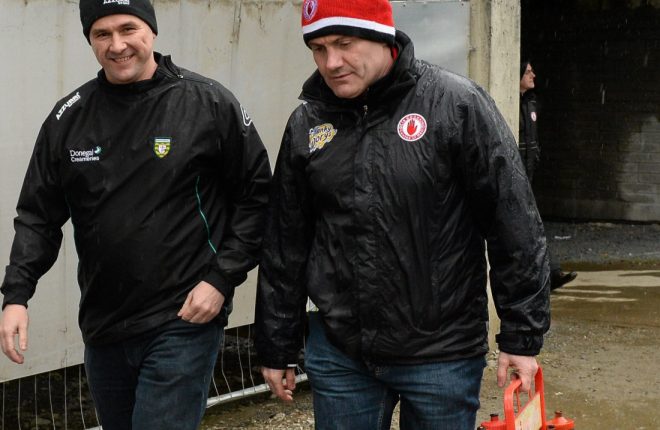
RED HAND…Ciarán McLaughlin took on so many roles in Tyrone GAA including chairperson.
“My only interest was in the Sigersons and what I could do to help the club. That’s why I went into the chair,” he said of his seven years in the role over two terms. “I was trying to make a difference in a positive way to move things on,”
Now, as Ulster President, it’s a position he fully enjoys and never once takes for granted. The one regret was his parents passing away and not getting to see him in the role.
“My father (Jimmy) had a strong interest in the GAA in his own youth and got another interest whenever I got involved with Tyrone, going to matches with the family,” he said.
Now in Ulster, he meets and works alongside so many people in a range of different spheres. Yes, there are times when things don’t go to plan, but, by and large, it’s a privilege.
“Time flies because you meeting so many people and it is a wonderful experience,” he added.
***
Each GAA President will put their own slant on their tenure and elect the sub committees they’ll surround themselves with.
Burns sounded out McLaughlin about taking over from Niall Erskine who had two terms in the post of World GAA chairman.
“I was privileged when Jarlath asked me to take on the role and I was interested,” said McLaughlin, explaining how Ulster have been twinned with Canada and Britain.
“Having saw how Canada operated and how magnificently things were going over there, to get a chance to help the other to develop is a great opportunity. I am delighted to get a chance to help GAA across the world in areas where it is ongoing,” he said of coming on board.
Some parts of the world are more established than others but the World GAA committee reach out the hand to anyone needing a steer.
After seeing their own daughter up sticks and moving to Australia, he has a handle on the emotion and logistics involved in making a move overseas.
“We have a lot of people going to see the world, it is smaller place and it is that sense of community and involvement,” he said.
“In the World GAA strategy, it is no coincidence that Health and wellbeing is one of the strong indicators.”
Some of the Irish would’ve stopped playing in their late teens but found a sense of community and belonging in getting involved in a club far away from home. It becomes even more important in the time of need, the comfort of having a shoulder to lean on.
“I met people in Canada who played when they were young and then drifted so they didn’t play again until they got out to Canada. It is the sense of belonging, it is hard to beat it,” said McLaughlin, who also pointed out the Trojan work of Sean Harte.
The Loughmacrory native recently passed away but not before he was honoured as the “Irishman of the Year” in Canada last year. His efforts, over many years, put Canadian GAA in a strong position, leaving their current committee with solid foundations.
“Sean left a legacy that no matter where you were going, if you were coming out from Ireland you could make a contact,” McLaughlin said. “That’s the health and wellbeing side of it and it was always going to be supported.”
McLaughlin, who was responsible for the process of appointing a health and wellbeing officer in every club, still feels its importance remains. Connections made off the pitch are the glue to keep communities together.
He has already met the GAA’s international manager Charlie Harrison and the first meeting takes place this week to get some initial planning for the next World Games in place.
“I am not in to sit and look around me to see what is going on around the world,” McLaughlin stated. “I am in to see what can be done in these key pillars that we want to try and develop.”
***
The World GAA strategy centres around four core areas: coaching and games, health and wellbeing, PR and officer training. Combined, they all point to a model that give overseas clubs the oars to paddle their own canoes.
“We aiming for self-sufficiency,” McLaughlin summed up of their plan. “There are great people involved but there are great fluctuations in populations.
“However, in places like America where communities are already established, it is easy to become self-sufficient.
“Then there are others that are falling in behind. The newest ones are the Middle East and Asia, those are areas we are trying to target to help them become self-sufficient.”
From an Ulster GAA point of view, they are linking in with Canada to provide coaching developers and referee tutors on a visit after Easter so they can lay their own structures in years to come,
In a recent feature with Gaelic Life, Dermot McGuigan of Seville GAA stressed the importance of their GAA support but raising awareness of the extent of their leagues in Spain was the club’s next step. That’s where the PR strand to World GAA’s plan comes in.
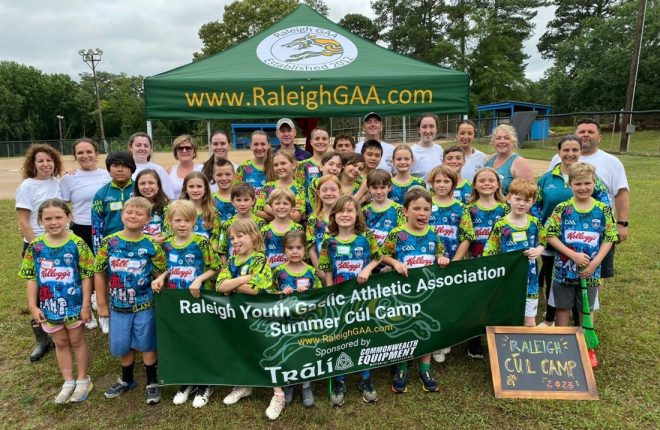
GRASS ROOTS…A Cúl Camp in Raleigh, US GAA
“That’s where I was fortunate,” McLaughlin offered. “When my own daughter went to Australia the first contact she made were the GAA clubs in Melbourne.
“She got the email addresses for them all and contacted them about getting started. It comes back to the awareness of what is going on across the world. It can then provide the opportunities to young people so we, as parents, know they are safe and sound over there.”
It creates a community that can blossom further from events held on weekends. A game or blitz in the morning will lead into a social gathering in the evening. In some cases, it’s a networking opportunity to open doors for jobs to further strengthen bonds.
A read through Mickey Colman’s book, Pulse, tells the tale of how those in his Irish community rallied around his family when he went through a life-threatening health scare.
From the point of view of training up club officers, it’s about offering advice on running a club with a theme of governance at its core.
“You want to make sure things are governed well no matter what part of the world we are in,” McLaughlin said. “If clubs are starting to avail of opportunities to spend a grant or raise income then you have got to govern yourself right from every aspect, from finance to safeguarding.
“That’s what we are about in the Association. We want to be the best we can be so the reputation is kept as high as it is.”
There is currently an international safeguarding document being drafted so each board and club will have a framework to follow.
“That’s where we need to be to be up there in terms of our reputation cover all the bases,” McLaughlin summed up. There is the importance of treating every club the same, whether in Ireland or trying to establish itself in some corner of the world.
Plans are in place to fully roll out the GAA Cúl Camps across the world. Again, McLaughlin mentions the health and wellbeing concept. Every active coaching session, game or social circle arms Gaels with a toolkit to outlast any action on the pitch.
The World Games is the flagship event every three years, something clubs can strive for alongside competing for their own silverware. To them, it’s their All-Ireland final, their version of Aimee Mackin or Shane McGuigan striving of win the big prize in Croke Park.
***
There is one massive end goal. But, is it feasible? Maybe. When will happen? Who knows? The GAA’s big picture from their international arm is getting their sports on the card for the Olympic Games.
“If we can get Gaelic Games into sporting federations, it helps us be recognised by the IOC eventually,” McLaughlin said.
“That will take time and it is another pillar of what we are trying to get done, but imagine that,” he questioned of having GAA under the world’s spotlight. Feelers have came in from the embassy in Mexico. There are pockets in South America asking to join the GAA family.
South American and Africa, McLaughlin admits, are the areas without “a substantial presence” so far. It’s an area for development.
“That is not in the short term but the work towards it is starting this year,” he added on the Olympic hopes. “How long it takes us to get to that position, well that’s a different situation.
“It is an aim because we can be a sport people are participating in across the world, being involved would be so important.”
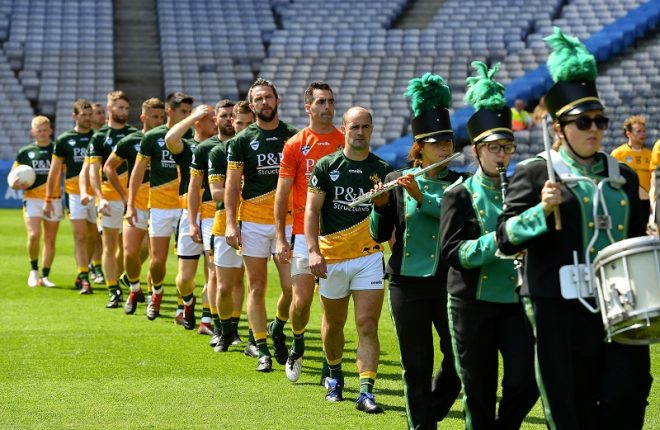
HQ… Australasia players in the parade before the 2019 GAA World Games final against Middle East at Croke Park
Aside from the long-term Olympic goal, how will success be quantified after the latest international strategy?
“For us to have units across the world that are sustainable, that’s where we want to get to,” McLaughlin sums up.
“We are in a good place already and we want to make sure we continue to develop that.
“If clubs are going to be sustainable then the games are going to develop with people coaching or in office administrating.
“We want to market those games well and provide opportunities for everybody to be involved across the world in our games.
“It is strengthening the units across the world from the position a lot of them are already in. To make sure they become recognised in the countries they are in and are recognised by those sporting bodies in those countries.
“We can then help them do more to facilitate the opportunities for the people going out from Ireland. Strengthen what we already have and increase the spread.
“The GAA across the world is flourishing. It is a wonderful organisation, the biggest amateur organisation in the world.”
Receive quality journalism wherever you are, on any device. Keep up to date from the comfort of your own home with a digital subscription.
Any time | Any place | Anywhere




